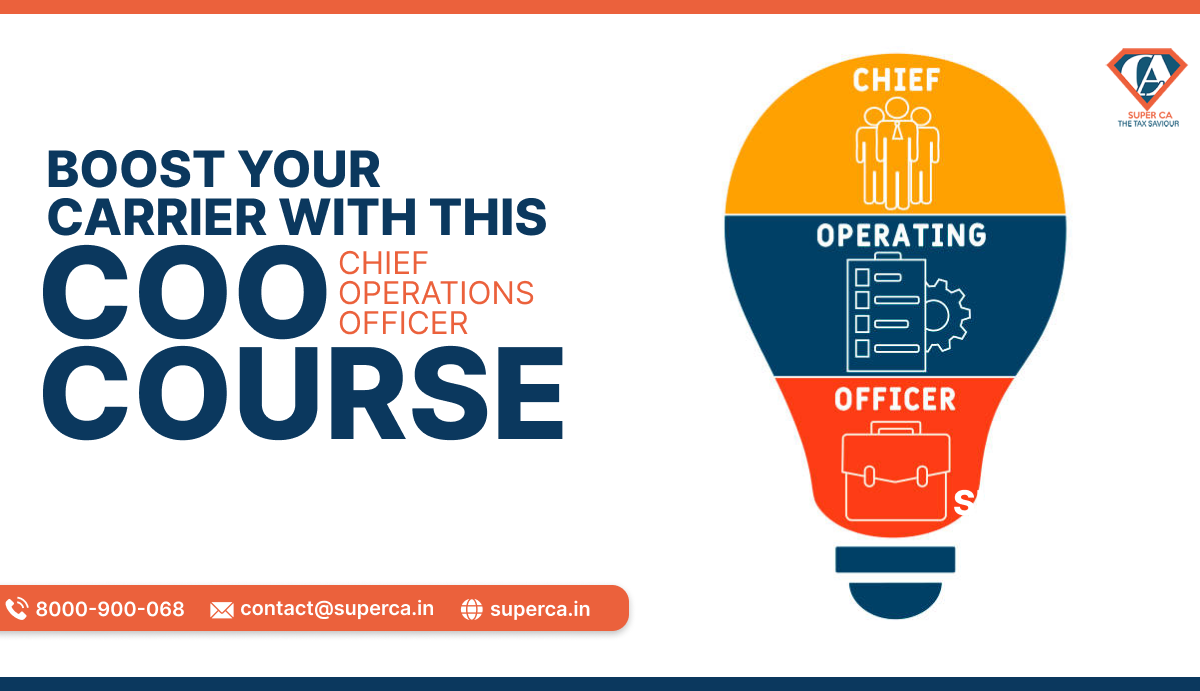
The role of a Chief Operations Officer (COO) entails the responsibility of effectively organizing, directing, and facilitating organizational change and transformation. To successfully navigate these endeavors, a COO can acquire valuable frameworks, resources, and strategies from a comprehensive COO curriculum. If you’re looking to boost your career as a Chief Operations Officer (COO) in India, there are various avenues you can explore.
A well-designed Chief Operations Officer (COO) program offers valuable knowledge and insights across multiple business areas, such as finance, marketing, sales, human resources, and strategy. By understanding these aspects, aspiring or new COOs can align operational initiatives with the organization’s broader goals and make informed decisions that contribute to the company’s overall success.
In essence, as a COO, you will be entrusted with the management of a company’s day-to-day operations. This involves leading and overseeing teams across various functional areas. To excel in this role, it is imperative for a COO to possess a comprehensive understanding of the broader business landscape, enabling them to be an influential and inspiring leader.
In today’s rapidly evolving industries and markets, it is crucial for a COO to stay updated on the latest trends and best practices. A COO program can provide valuable insights into emerging industry trends, technological advancements, regulatory changes, and market dynamics. Armed with this knowledge, COOs can proactively make strategic decisions, identify new opportunities, and maintain a competitive edge.
Chief Operations Officer course in India
Emeritus offers leadership programs designed to empower the next generation of COOs with the skills, insights, and perspectives necessary to position themselves as digital strategists. One notable program is the Chief Operations Officer program offered by the Indian Institute of Management (IIM) Lucknow (L).
The Chief Operations Officer program at IIM Lucknow (L) covers a wide range of subjects, equipping participants with essential skills to navigate the challenges and seize the opportunities presented by today’s dynamic business environment. Key areas of focus include operations strategy, risk management, supply chain optimization, and project management. These skills are essential for COOs to effectively manage the operational aspects of an organization. Additionally, the program emphasizes networking opportunities with fellow CXOs, enabling participants to stay updated on industry trends and forge valuable connections.
Where to Apply?
The Chief Operations Officer program offered by the Indian Institute of Management (IIM) Lucknow (L) encompasses a wide range of subjects. It equips participants with the necessary tools to navigate the opportunities and challenges presented by a dynamic corporate environment.
The program’s key focus areas include operations strategy, risk management, supply chain optimization, and project management. These skills are crucial for COOs to effectively manage businesses and drive efficiency.
Here is a checklist summarizing the important details of the IIM Lucknow Chief Operations Officer program:
- Introduction: June 30, 2023
- Start of classes: July 23, 2023
- Program duration: 11 months
- Learning modalities: Live online classes with professors and on-campus immersion
- Commitment: Once every week for 3 hours, from 3:30 pm to 6:30 pm on Sundays
- Target audience: Business executives, prospective COOs, and new COOs
- Certification: Participants will receive a certificate of completion and may be eligible for IIM Lucknow’s Executive Alumni Status (optional) upon achieving at least 75% attendance and satisfactory academic performance. The cumulative proportion of marks should be at least 50%.
Eligibility
The following is the eligibility requirement for the COO program:
- Graduates (10+2+3) or holders of a diploma (10+2+3)
- Postgraduates who, as of 30 June 2023, had at least ten years of work experience
- Candidates should also be employed right now and have marks minimum of 50% in their graduate, diploma, or postgraduate exams.
Qualities of COOs
Based on the provided information, the qualities that experts note as important for COOs (Chief Operating Officers) are:
Good communication skills:
COOs need to be effective communicators and leaders. They should be able to convey information clearly and concisely, both within the organization and externally. Understanding the nuances and complexities of different situations is essential for effective communication.
Strong interpersonal skills:
People skills are crucial for COOs. They should have the ability to work well with others, build relationships, and manage teams effectively. COOs need to understand the needs and challenges of their employees and provide support and guidance when necessary.
Problem-solving and analytical skills:
COOs should possess organizational and analytical skills to identify and solve problems. They need to be able to develop procedures and strategies that optimize operational efficiency and drive positive business outcomes.
Empathy and understanding:
COOs should demonstrate empathy and understanding towards their employees. By actively participating in their work lives and showing genuine care, COOs can foster trust and create a supportive work environment. This helps employees buy into the company’s vision and enhances team morale.
Bottomline
Building a successful career as a Chief Operations Officer (COO) is a challenging endeavor that requires a diverse range of knowledge and a deep passion for the industry. However, if you possess exceptional project management skills and find yourself invigorated by the day-to-day responsibilities of leading a business, embarking on a COO career can be an immensely gratifying journey. By dedicating yourself to this goal and putting in the necessary effort, the pursuit of attaining the COO title can yield substantial rewards.
By enrolling in a COO program, you can also network with other aspiring or working COOs, industry professionals, and thought leaders. Through networking, beneficial chances for cooperation, knowledge exchange, and mentoring may arise.




